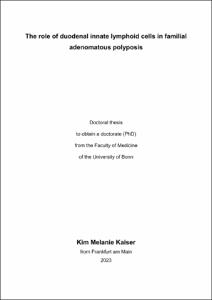Kaiser, Kim Melanie: The role of duodenal innate lymphoid cells in familial adenomatous polyposis. - Bonn, 2023. - Dissertation, Rheinische Friedrich-Wilhelms-Universität Bonn.
Online-Ausgabe in bonndoc: https://nbn-resolving.org/urn:nbn:de:hbz:5-72345
Online-Ausgabe in bonndoc: https://nbn-resolving.org/urn:nbn:de:hbz:5-72345
@phdthesis{handle:20.500.11811/11047,
urn: https://nbn-resolving.org/urn:nbn:de:hbz:5-72345,
author = {{Kim Melanie Kaiser}},
title = {The role of duodenal innate lymphoid cells in familial adenomatous polyposis},
school = {Rheinische Friedrich-Wilhelms-Universität Bonn},
year = 2023,
month = sep,
note = {Familial adenomatous polyposis (FAP) is an inherited gastrointestinal tumor syndrome. Apart from colonic polyposis and colorectal cancer, the occurrence of duodenal adenomas is the most common intestinal manifestation of FAP, resulting in a significantly increased risk of developing duodenal cancer compared to the general population. Only a proportion of FAP patients develop duodenal adenomas and the extent of duodenal polyposis varies considerably. Even within carriers of the same genetic variant of the adenomatous polyposis coli (APC) gene, duodenal phenotype and clinical course vary, indicating that, in addition to the genotype, other factors such as the local immune system play a role.
Here, we analyzed the potential role of innate lymphoid cells (ILCs) in the duodenal adenoma formation in FAP. Intestinal lymphocytes were isolated from normal and adenomatous tissue samples of 90 FAP and 35 non-FAP patients obtained during routine endoscopy and analyzed regarding phenotype and function by flow cytometry. Mucosal mRNA levels were assessed by qRT-PCR and bulk-RNA-seq. Furthermore, duodenal organoids were generated to analyze ILC function during adenoma formation.
Frequency of total ILCs was significantly increased in normal duodenal mucosa in FAP patients compared to controls and was highest in FAP adenoma tissue. This was especially true for group 3 ILCs (ILC3s). More importantly, we found FAP to be associated with an increased IL-17A production of duodenal NKp44- ILC3s. No such findings were made regarding colon ILC3s in FAP, indicating a duodenum-specific effect. Cytokines such as IL-1β and IL-23A and the Notch ligand Delta-like 4 (DL4) have been shown to be important in the regulation of intestinal ILC3 differentiation, maturation and function. We found IL1B, IL23A, and DL4 mRNA expression to be significantly elevated in FAP duodenal adenoma and normal tissue and to correlate positively with the frequency of IL-17A+ NKp44- ILC3s. Accordingly, we observed culturing NKp44- ILC3s on DL4 expressing OP9 feeder cells (OP9-DL4) in the presence of IL-1β/IL-23 to significantly increase ILC3’s IL-17A production. Furthermore, bulk-RNA-seq and qRT-PCR revealed that duodenal adenomas of FAP patients had higher levels of dual oxidase 2 (DUOX2) and its maturation factor DUOXA2, which can promote cancer due to increased H2O2 production. Functional studies demonstrated both recombinant IL-17A and activated NKp44- ILC3s to induce expression of DUOX2 and DUOXA2 in duodenal organoids.
These results suggest IL-17A-producing NKp44- ILC3 to be involved in duodenal adenoma formation in FAP patients.},
url = {https://hdl.handle.net/20.500.11811/11047}
}
urn: https://nbn-resolving.org/urn:nbn:de:hbz:5-72345,
author = {{Kim Melanie Kaiser}},
title = {The role of duodenal innate lymphoid cells in familial adenomatous polyposis},
school = {Rheinische Friedrich-Wilhelms-Universität Bonn},
year = 2023,
month = sep,
note = {Familial adenomatous polyposis (FAP) is an inherited gastrointestinal tumor syndrome. Apart from colonic polyposis and colorectal cancer, the occurrence of duodenal adenomas is the most common intestinal manifestation of FAP, resulting in a significantly increased risk of developing duodenal cancer compared to the general population. Only a proportion of FAP patients develop duodenal adenomas and the extent of duodenal polyposis varies considerably. Even within carriers of the same genetic variant of the adenomatous polyposis coli (APC) gene, duodenal phenotype and clinical course vary, indicating that, in addition to the genotype, other factors such as the local immune system play a role.
Here, we analyzed the potential role of innate lymphoid cells (ILCs) in the duodenal adenoma formation in FAP. Intestinal lymphocytes were isolated from normal and adenomatous tissue samples of 90 FAP and 35 non-FAP patients obtained during routine endoscopy and analyzed regarding phenotype and function by flow cytometry. Mucosal mRNA levels were assessed by qRT-PCR and bulk-RNA-seq. Furthermore, duodenal organoids were generated to analyze ILC function during adenoma formation.
Frequency of total ILCs was significantly increased in normal duodenal mucosa in FAP patients compared to controls and was highest in FAP adenoma tissue. This was especially true for group 3 ILCs (ILC3s). More importantly, we found FAP to be associated with an increased IL-17A production of duodenal NKp44- ILC3s. No such findings were made regarding colon ILC3s in FAP, indicating a duodenum-specific effect. Cytokines such as IL-1β and IL-23A and the Notch ligand Delta-like 4 (DL4) have been shown to be important in the regulation of intestinal ILC3 differentiation, maturation and function. We found IL1B, IL23A, and DL4 mRNA expression to be significantly elevated in FAP duodenal adenoma and normal tissue and to correlate positively with the frequency of IL-17A+ NKp44- ILC3s. Accordingly, we observed culturing NKp44- ILC3s on DL4 expressing OP9 feeder cells (OP9-DL4) in the presence of IL-1β/IL-23 to significantly increase ILC3’s IL-17A production. Furthermore, bulk-RNA-seq and qRT-PCR revealed that duodenal adenomas of FAP patients had higher levels of dual oxidase 2 (DUOX2) and its maturation factor DUOXA2, which can promote cancer due to increased H2O2 production. Functional studies demonstrated both recombinant IL-17A and activated NKp44- ILC3s to induce expression of DUOX2 and DUOXA2 in duodenal organoids.
These results suggest IL-17A-producing NKp44- ILC3 to be involved in duodenal adenoma formation in FAP patients.},
url = {https://hdl.handle.net/20.500.11811/11047}
}






